
- This event has passed.
2024 ASC Annual Meeting
November 13 - November 16
$200.00
Criminological Research and Education Matters: People, Policy, and Practice in Tumultuous Times These are tumultuous times. Massive misinformation abounds as political polarization continues to be consequential for our lives. Trust in science is declining as global warming persists. Confidence in higher education is eroding as compelling research on pressing social problems, including those related to crime and criminal legal systems, is conducted in the arguably insular world of academe. Threats to democracy in the U.S. are worrisome as parts of the world are moving toward autocracy. Criminologists and others in the knowledge business do their work—research, education, policymaking, and public service more generally—in what has been called a “post-truth society.” In this context, we are rightly called upon to conduct and disseminate credible research that advances science and has relevance for people’s lives; play a significant role in preparing students for the future while debates about who should govern what we teach unfold; and contribute to public policymaking in ways that respect evidence, enable the pursuit of justice, and understand the inherently messy nature of social and institutional life. With this in mind, the theme of this year’s program, Criminological Research and Education Matters: People, Policy, and Practice in Tumultuous Times, invites us to interrogate the ways in which criminology is—and is not—responding to the times in which we live and, indeed, meeting the challenges of our times. Definitions of tumultuous often include the words “excited” and “confused.” What are we excited about? What are we confused about? Who is the “we” here? What “policy” and what “practice” excites us and confuses us? Finally, what matters to us and why? Answers to these questions, however qualified and contingent, can and should guide the future of the field in ways that help us reach our loftiest aspirations. Let’s talk about it in San Francisco, the City by the Bay.
